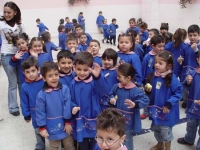Preservation of Armenian identity is encouraged

The pan-Armenian awards “For notable contribution to the preservation of Armenian identity” was one of the issues on the agenda of the joint advisory board session held by the RA Ministries of Territorial Administration and Diaspora on October 12.
In spring 2011, the RA Ministry of Diaspora and the World Armenian Congress declared the annual pan-Armenian awards “For notable contribution to preservation of the Armenian identity”. This year’s awards includes three categories:
Best Mother Language Teacher
Best Youth Organization
“Piece of Homeland” Youth Armenology Studies
For each category, the RA Ministry of Diaspora and the World Armenian Congress have established professional contest committees thathave developed the application forms and standards of assessment. It is nice to see that there is a total of 69 applications in all three categories, which goes to show that the issues related to preservation of the Armenian identity are gradually sparking responses abroad and interest among many people, and are especially sparking interest among Armenian youth. There are 16 applications for the “Piece of Homeland” category. This can be considered an achievement because there is more and more attention toward Armenology, and the youth especially in the Diaspora are showing interest in that field of study. “In all times, the Armenian people have been able to confront trials and tribulations through Armenians’ creativity and leap of thought. By advancing, receiving knowledge about those trials and tribulations and witnessing those trials and tribulations today, the youth form their own view of the world and value system. Each youth views the homeland in his way, and these studies serve as a wonderful opportunity for the youth to recognize the homeland through their eyes,” as mentioned during the advisory board session. The Ministry of Diaspora is not setting limits on the number of participants and has declared that the youth Armenology contest is open to students, post-graduate students and young scientists from Armenia and the Diaspora under the age of 35.
To make Armenology research more purposeful, it would be preferable for the committee to develop certain topics, principles, look forward to support from the Armenology institutes of the National Academy of Sciences in preparing the investigations, as well as engage the departments of universities involved with research. The purposeful investigations will not only encourage interest in Armenology, but will also help include the investigations in the curricula and will be applied at universities in the Diaspora. To fulfill this desire, it is preferable to include scientists and advisors in the professional committees.
Levon Mutafyan




 Արևելահայերեն
Արևելահայերեն Արևմտահայերեն
Արևմտահայերեն Русский
Русский






